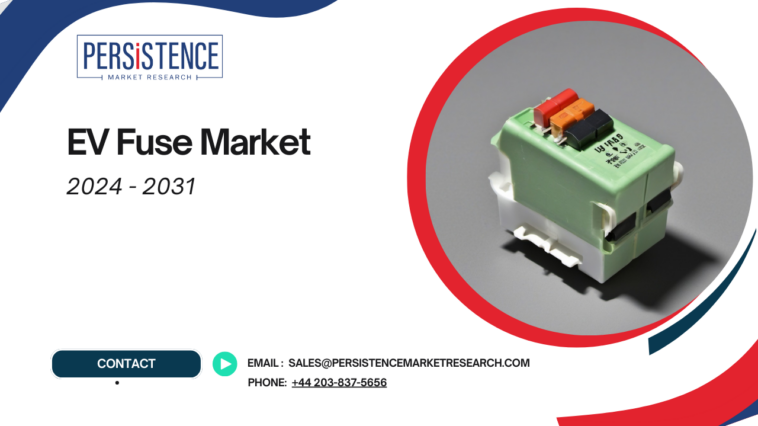As electric vehicles (EVs) continue to transform the automotive landscape, the demand for high-quality and reliable components, including fuses, has grown significantly. EV fuses are critical safety devices that protect the vehicle’s electrical systems from power surges, short circuits, and overloads. However, ensuring the quality and reliability of these fuses throughout the supply chain is a complex process. This blog explores the challenges faced by manufacturers, suppliers, and automakers in maintaining fuse quality and reliability, as well as the opportunities for improvement and innovation.
For More Industry Insight: https://www.persistencemarketresearch.com/market-research/ev-fuse-market.asp
Challenges in Ensuring Quality and Reliability of EV Fuses
1. Complex Supply Chains
The global supply chain for EV fuses involves multiple stages, from raw material extraction to manufacturing and distribution. Each stage introduces potential risks that can impact the quality and reliability of the final product. For instance:
-
Material Sourcing: Ensuring the consistent availability of high-quality raw materials, such as copper, silver, and ceramics, is crucial. Variability in the quality of these materials can affect the fuse’s performance, leading to potential failures in the vehicle’s electrical system.
-
Supplier Relationships: Manufacturers often rely on multiple suppliers for different components and materials. Ensuring quality across a fragmented supply chain can be challenging, as it requires strong communication, coordination, and quality control measures at every step.
2. Meeting Stringent Safety Standards
Electric vehicles operate at higher voltages and currents compared to traditional internal combustion engine (ICE) vehicles. This increases the risk of electrical faults, making it essential for fuses to meet stringent safety standards. However, ensuring that all fuses comply with these regulations across the supply chain can be difficult.
- Quality Testing and Certification: Manufacturers must conduct rigorous testing to ensure that each fuse meets safety standards, such as those set by the International Electrotechnical Commission (IEC) and Underwriters Laboratories (UL). However, maintaining consistent testing protocols throughout the supply chain is challenging, especially when multiple suppliers and production sites are involved.
3. Counterfeit Products and Quality Control
The increasing demand for EV components has led to a rise in counterfeit and substandard products entering the market. These counterfeit fuses may not meet the necessary safety and performance standards, posing serious risks to vehicle safety.
- Detection and Prevention: Detecting counterfeit products within the supply chain can be difficult, particularly if manufacturers or distributors do not have robust quality control measures in place. Without thorough inspections and testing, counterfeit fuses can make their way into vehicles, compromising their safety and reliability.
4. Supply Chain Disruptions
Global events such as the COVID-19 pandemic, geopolitical tensions, and natural disasters can disrupt the supply chain, leading to delays and shortages. These disruptions can result in manufacturers rushing production, potentially compromising quality control procedures in an effort to meet demand.
- Ensuring Consistency: Supply chain disruptions can create inconsistencies in the production process, leading to variations in the quality of fuses. Ensuring that fuses remain reliable even in the face of such challenges requires effective risk management and contingency planning.
Opportunities for Improving Quality and Reliability in the EV Fuse Supply Chain
1. Advanced Quality Control Technologies
One of the most promising opportunities for ensuring the quality and reliability of EV fuses is the use of advanced quality control technologies.
-
Automation and AI: Automated systems, powered by artificial intelligence (AI), can help manufacturers identify defects and inconsistencies in fuses with greater accuracy and speed. AI-powered testing systems can analyze data from multiple points in the production process, flagging any deviations from the required standards. This can reduce human error and improve overall product quality.
-
Real-Time Monitoring: Implementing real-time monitoring systems throughout the supply chain can provide manufacturers with immediate feedback on the quality of materials and components. By identifying potential issues early, manufacturers can take corrective actions before the fuses reach the market.
2. Stronger Supplier Relationships and Collaboration
Building strong, transparent relationships with suppliers is key to ensuring consistent quality throughout the supply chain. Manufacturers can work closely with suppliers to establish clear expectations, share quality control protocols, and conduct regular audits.
-
Supplier Audits and Certifications: By conducting regular audits of suppliers and requiring certifications, manufacturers can ensure that all materials and components meet the necessary quality standards. This proactive approach reduces the risk of substandard or counterfeit products entering the supply chain.
-
Collaboration on Innovation: Collaborative efforts between manufacturers and suppliers can lead to the development of new materials and technologies that enhance fuse performance. For example, suppliers may develop new conductive materials that improve heat dissipation, increasing the durability and reliability of EV fuses.
3. Blockchain Technology for Supply Chain Transparency
Blockchain technology is emerging as a powerful tool for improving transparency and traceability within the supply chain. By using blockchain, manufacturers can track each fuse’s journey from raw material sourcing to the final product, ensuring that it meets quality standards at every stage.
- Traceability and Accountability: Blockchain can provide a secure, transparent record of each step in the production process, reducing the risk of counterfeit products and ensuring that all fuses are sourced and manufactured in compliance with safety standards. This can enhance accountability across the supply chain and provide automakers with greater confidence in the quality of the fuses they use.
4. Sustainability and Recycling Initiatives
Sustainability is becoming a critical focus in the automotive industry, and there is an opportunity for EV fuse manufacturers to align with this trend. Developing sustainable materials and implementing recycling programs can reduce the environmental impact of fuse production while maintaining quality.
- Recycling Programs: Manufacturers can develop programs to recycle materials from used or faulty fuses, reducing the reliance on raw materials and ensuring consistent quality. Recycled metals like copper and silver can be reused in new fuses without compromising performance.
This post was created with our nice and easy submission form. Create your post!





